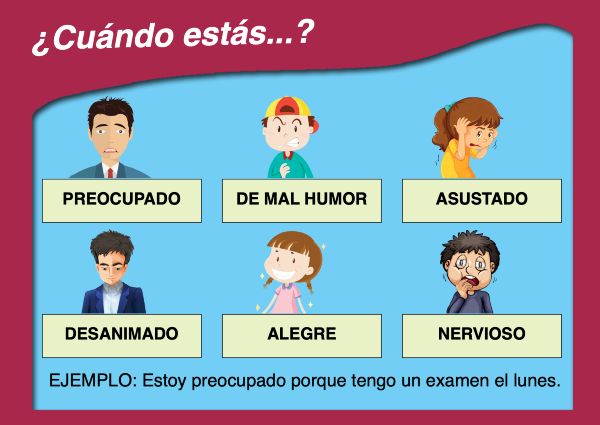Objective: review vocabulary about feelings
Required materials: none
Preparation: none
Time: 5-10 minutes
Number of students: any
Directions:
This is a fun activity I sometimes use at the beginning of the class, to break the class dynamic and do something different, but it can also be used to review vocabulary about feelings.
Ask a few students "¿cómo estás?". In my classes, there are always many -if not all- "bien" or "muy bien" replies. I tell every student that I want them to think of a different answer to the question ¿cómo estás? Any answer will be ok if they are only one word and if they are different to "bien".
Then I ask students to stand up, and I remind them the rules of the activity (they must think of an answer to cómo estás that is not bien and it has only one word).

Once everybody is up and understands the rules, I tell them I'll try to guess the answers they are thinking. They must be honest and sit down if I say the word they have in their minds.
Then I start brainstorming possible answers, mixing the positive (fantástico, genial, increíble, feliz, alegre, contento), the popular (cansado, confuso), the intermediate (normal, regular) and the negative ones (mal, enfermo, malo, aburrido, terrible, horrible, triste, enojado, enfadado).
When I can't think of anything else, I ask the remaining students to share their answers. This is a good moment to fix mistakes: some students might say words we use with tener in Spanish (frío, caliente, hambre, sueño or miedo) and others may not have followed the game rules. Hopefully, there will also be some kids that thought of valid answers I didn't say. We should congratulate them and make sure everybody understands the words they used.

Follow-up activities:
The warm-up activity of our ¿Cómo estás? lesson is about asking students to make sentences explaining when they have certain feelings (Estoy preocupado porque tengo un examen el lunes).
You could use that idea to practice the new words students used during this activity. If one of them, for example, used the word relajado, we could ask students on the following day: ¿Cuándo estás relajado?
We could choose five or six of the most interesting answers and carry out a warm-up like this one.



One Comment on “¿Cómo estás?”
Siempre me han encantado las actividades y videos de Bablingua!!!